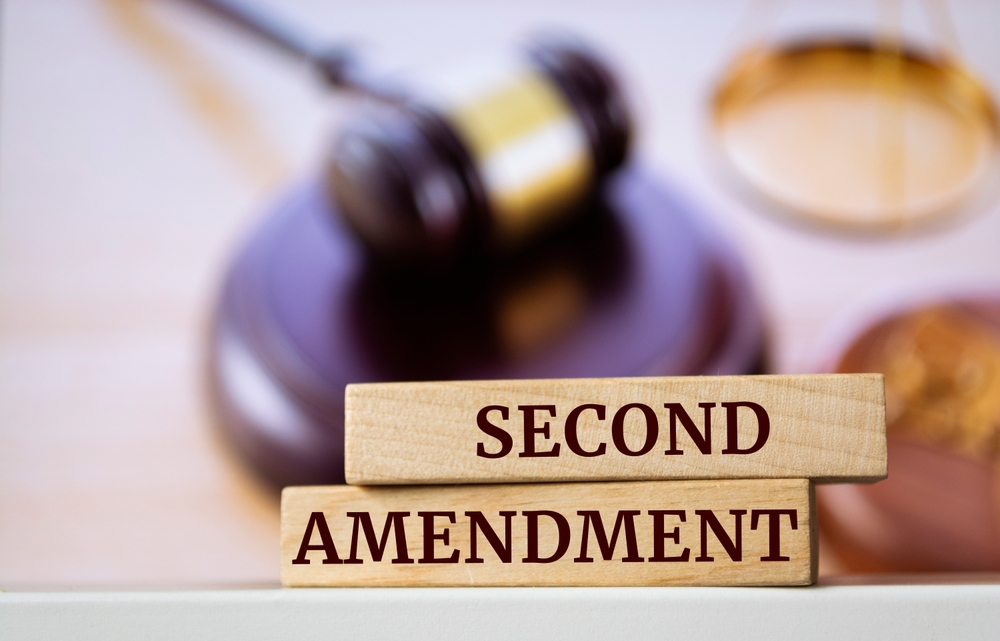2A NEWSLETTER: WEEK OF DECEMBER 29TH

Image Source: Shutterstock via Ringo Chiu
Federal Judge Upholds 2A: Blocks California's Overreaching Gun Law
In a landmark decision, a federal judge has declared major sections of California's new gun control law unconstitutional. This ruling is a significant win for gun rights, reinforcing the constitutional right to bear arms.
The contentious Senate Bill 2, championed by California Democrats, sought to restrict licensed gun holders from carrying firearms in numerous public spaces. This bill was a response to the recent U.S. Supreme Court ruling limiting gun control measures and to high-profile shootings in California.
U.S. District Judge Cormac J. Carney, appointed by President George W. Bush, criticized the law for its broad scope and infringement on the Second Amendment. Carney emphasized that the law's extensive restrictions went against the principles of the Supreme Court's ruling and the constitutional rights of responsible, law-abiding citizens.
This decision highlights the importance of upholding constitutional rights against overreaching legislation. It acknowledges the rigorous vetting and training process that licensed gun holders undergo, affirming their right to self-defense.
Despite the ruling, Governor Gavin Newsom and Attorney General Rob Bonta remain defiant, vowing to continue their fight for gun control. They argue for the safety of public spaces, but this stance overlooks the rights and responsibilities of legal gun owners.
The blocking of SB 2 represents a crucial victory for Second Amendment supporters. It underscores the need to balance public safety with constitutional freedoms. The ruling sends a strong message against excessive gun control measures and respects the rights of law-abiding citizens to bear arms for self-defense.
It’s important that we remain informed and engaged. As the legal battle continues, it's essential to monitor developments and support efforts that protect our constitutional rights.

Image Source: Shutterstock via Allexxandar
Guns, Rights, and the Buckeye State: Ohio's House Bill 51
Ohio stands at a pivotal moment for Second Amendment rights with House Bill 51, the "Second Amendment Preservation Act". This proposed legislation firmly backs state sovereignty and gun owner rights by challenging federal overreach.
House Bill 51 is a bold step to ensure that state laws take precedence over conflicting federal gun laws. It proposes to penalize any entity that enforces federal gun restrictions over state laws, reinforcing Ohio's commitment to its citizens' constitutional rights.
House Speaker Jason Stephens (R-Kitts Hill) champions the bill, emphasizing the importance of state autonomy in gun legislation. This bill represents a stand against federal attempts to dictate local gun policies and an affirmation of the 10th Amendment.
Despite its importance for gun rights, the bill faces criticism from Democrats, including House Minority Leader Allison Russo (D-Upper Arlington), who labels it as "dangerous, overlooking the fundamental rights protected by the Second Amendment and the importance of state governance in firearms regulation.
The bill's journey is still ongoing, with further discussions planned to refine its language and ensure compliance with existing laws. Speaker Stephens highlights the need to address significant constitutional questions and is optimistic about bringing the bill to a vote next year.
While Democrats push for alternative measures like universal background checks and red flag laws, these proposals lack broad support in the House. Speaker Stephens underlines that such measures don't align with the public's desire for less government intrusion into their constitutional rights. Stephens points to a more effective approach: tackling repeat offenders and violent crimes, thus safeguarding communities without infringing on Second Amendment rights.
Lieutenant Governor Jon Husted reiterates the importance of protecting Second Amendment rights, especially in the context of national security concerns. “Communities are sometimes feeling unsafe. As we don’t protect our southern border, we have criminals and cartels coming into America, affecting the health and safety in our communities,” he said. “So, I think more and more people want to make sure their Second Amendment rights are protected.”

Image Source: Shutterstock via Uuganbayar
Senate Shoots Down Assault Weapons Legislation with Aim to Preserve Second Amendment Rights
Senate Majority Leader Chuck Schumer announced his intention to bring legislation to the Senate floor that aims to reinstate the nation’s assault weapons ban, which expired nearly 20 years ago. In response, Senate Republicans blocked Schumer’s efforts to pass an assault weapons ban and Democratic Senator Chris Murphy's universal background checks legislation. Republican Senator John Barrasso of Wyoming countered Schumer's request for unanimous consent to pass the assault weapons ban. Barrasso emphasized that the proposed ban, initially sponsored by the late Senator Dianne Feinstein, would infringe upon the Second Amendment and unfairly target law-abiding gun owners. He argued that the bill's focus on the appearance of certain firearms, like semiautomatic rifles, overlooks their functionality, which is similar to other rifles used for hunting and personal protection.
Barrasso firmly stated, "The Second Amendment is freedom's essential safeguard. Without it, there can be no liberty and there can be no security."
Additionally, Murphy's push for unanimous consent to pass legislation requiring universal background checks for firearms purchases faced objection from Republican Senator Mike Lee of Utah. Murphy's emotive plea, citing overwhelming public support for background checks was met with a practical response from Lee. Murphy's statement, "This just feels like a test of democracy... Like, how does democracy survive if 90 percent of Americans, 90 percent of Republicans, 90 percent of Democrats want something, and we can’t deliver it?" highlights a common argument used by some on the left, appealing to emotional sentiment and public opinion as the basis for legislative action.
Senator Lee's immediate objection embodied a different approach, emphasizing reasoned legislation over the emotional appeal. Lee's statement, "We’re not asked to vote in this chamber on polling questions. We vote on legislation," serves as a reminder of the legislative process's focus on the practicality and legal soundness of laws, rather than public sentiment. This perspective argues for a more measured approach, where laws are scrutinized for their broader implications, practicality, and alignment with constitutional principles, rather than being driven by emotional responses or public opinion polls.
Lee's response is a perfect counter to the tendency of some politicians to use emotion rather than reason in legislative debates. His focus on the technicalities and specifics of the proposed legislation, particularly its impact on private transactions like family inheritance of firearms or lending guns for protection, highlights the complexities involved in lawmaking that go beyond public opinion. This approach highlights the belief in the importance of careful consideration and analysis in the legislative process, ensuring that laws are not only popular but also practical, effective, and constitutionally sound.



 Back to List
Back to List